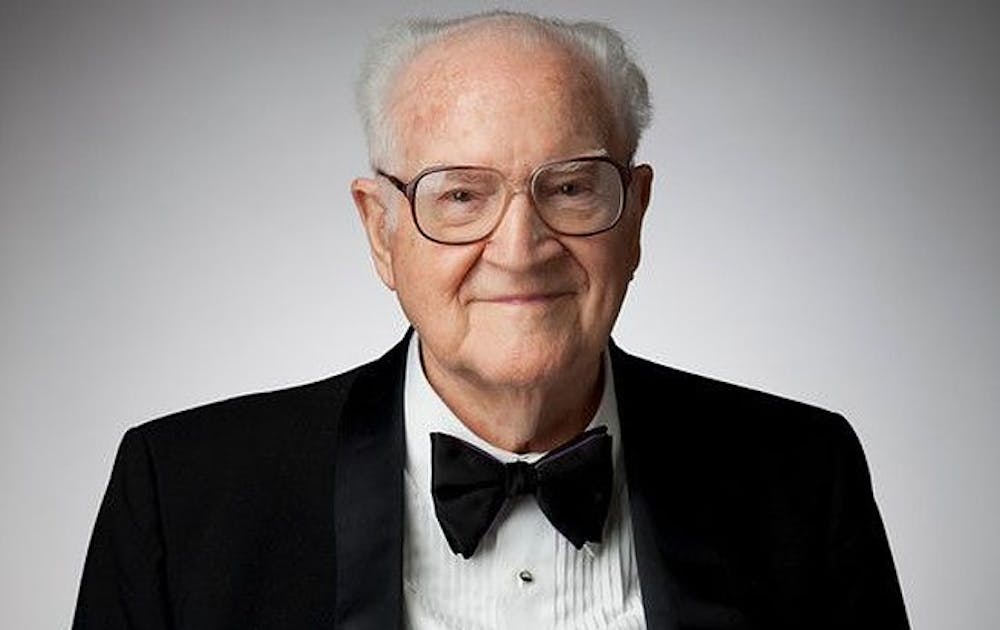Composer and music professor emeritus Robert Ward, who died last week at the age of 95, created award-winning operas, symphonies and instrumental pieces and enriched the world of music as an avid educator, administrator, jazz band leader, publisher and musician.
Ward is perhaps best remembered for his Pulitzer Prize-winning opera “The Crucible,” adapted from the Arthur Miller play dramatizing the Salem Witch Trials as an allegorical critique of American McCarthyism and the anti-communist Red Scare of the 1950’s. Ward’s 1961 opera remains one of the most frequently performed American operas, consistently produced in the U.S. and in international opera houses.
“Robert Ward was a significant, vibrant force in American music,” Anthony Kelley, Trinity ’91 and associate professor of the practice of music, wrote in an email Monday.
Ward found his passion for composition at a young age, when he began singing and playing piano. Soon after graduating from high school in Cleveland, he left for New York to study at both the Eastman School of Music and the Juilliard School, with a summer at the Berkshire Music Center in Massachusetts where he studied composition with Aaron Copland.
Ward’s playing and writing continued as he enlisted in the Army in 1942, when he attended the Army Music School at Fort Myer in Virginia. Throughout his service he composed several works for the army marching band and jazz band. During the war, Ward met Red Cross worker Mary Benedict, whom he married in 1944. She passed away in 2006.
His perseverance to his art brought him recognition—Ward has been honored on numerous occasions for his operatic, symphonic and instrumental works. Ward was awarded three separate Guggenheim Fellowships during the ’50s and ’60s to continue composing, and he was inducted into the American Academy of Arts and Letters in 1967. He received the Old North State Award for dedication to the arts in North Carolina in 2007 and the Opera Honors from the National Endowment for the Arts— one of the highest national distinctions for operatic composition— in 2011.
Ward’s ability to channel the emotion of the time made his work moving. Stephen Jaffe, Mary and James Semans professor of music composition, noted that the success of “The Crucible” was instrumental in reviving faith in the American opera, which struggled to gain popularity in the 1950s and ’60s.
“It was very rare for an [American] opera to become so well-liked that everybody wants to do it,” said Jaffe. “And yet, there must have been a professional production [of The Crucible] running every year since its premiere.”
In addition to his compositions, Ward’s involvement with arts education, administration and publication made him a versatile contributor to the music world, especially in North Carolina. When the founder of the North Carolina School of the Arts passed away just a few years into the school’s development, Ward was called on to serve as chancellor. His dedication to the school was crucial to its development.
Jaffe characterized Ward’s instruction style as one that emphasized practicality and accessibility in composition. Jaffe noted that Ward’s take on teaching was borne out of his years of experience writing and directing works.
After serving ten years as chancellor of the NCSA, he came to Duke as a visiting professor and later became a Mary Duke Biddle professor of music. Ward also served as an executive for the classical music publisher Galaxy Music Corporation and as a member on countless other arts councils and boards.
“He was a real composer, a Composer with a capital C,” said Jaffe. “And he was my colleague, Colleague with a capital C.”
Ward is survived by his five children—Melinda, Jonathon, Mark, Johanna and Tim—as well as 11 grandchildren and three great-grandchildren.
“What’s hard about it is that he was a dear friend,” said Jaffe. “I’ll miss him.”
Get The Chronicle straight to your inbox
Signup for our weekly newsletter. Cancel at any time.

